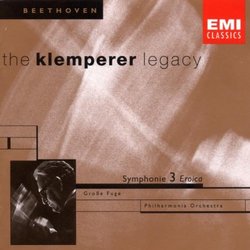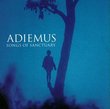| All Artists: Ludwig van Beethoven, Otto Klemperer, Philharmonia Orchestra Title: The Klemperer Legacy: Beethoven Symphony No.3 ("Eroica"); Grosse Fuge Members Wishing: 0 Total Copies: 0 Label: Angel Records Original Release Date: 1/1/1956 Re-Release Date: 11/3/1998 Album Type: Original recording remastered Genre: Classical Styles: Chamber Music, Historical Periods, Classical (c.1770-1830), Modern, 20th, & 21st Century, Symphonies Number of Discs: 1 SwapaCD Credits: 1 UPC: 724356679320 |
Search - Ludwig van Beethoven, Otto Klemperer, Philharmonia Orchestra :: The Klemperer Legacy: Beethoven Symphony No.3 ("Eroica"); Grosse Fuge
 | Ludwig van Beethoven, Otto Klemperer, Philharmonia Orchestra The Klemperer Legacy: Beethoven Symphony No.3 ("Eroica"); Grosse Fuge Genre: Classical
|
Larger Image |
CD DetailsSimilarly Requested CDs |
CD ReviewsOne of Klemperer's Greatest Recordings kek5 | Westerville, Ohio USA | 10/20/2000 (5 out of 5 stars) "Otto Klemperer is generally recognized as one of the great conductors of the 20th century, and nowhere did he shine brighter than in Beethoven. This performance with the Philharmonia ranks as perhaps the best in a great cycle of Beethoven's symphonies. Using his trademark style of unusually slow tempos combined with an unerring control of musical ebb and flow, Klemperer produces a striking sense of grandeur that is completely appropriate for the third symphony. The Philharmonia plays beautifully and the recording, though 1960s analogue, is very good. Every Beethoven lover should have at least one symphony from Klemperer's cycle with the Philharmonia, and given a choice this one would be the one for me (although his versions of the fourth and seventh symphonies are wonderful as well)." The best Baker Sefton Peeples | Santa Cruz, CA United States | 09/16/2001 (5 out of 5 stars) "I've heard numerous recordins of this symphony, but I was simply blown away by this one like no other. I can't think of a more grand or elemental performace extant. Neither Klemperer or the Philharmonia orchestra let this grand conception out of their minds. The beginning chords are weighty, not whiplash like many others i've heard, and this truly sets the tone for the rest of the recording. Klemperer was keen on structure and relationships from movement to movement, which helps him in the long first movement, the episodic funeral march (which i dare say is perfectly done and absolutely penetrating), and especially the variations of the last movement. Be prepared to be shattered by the grandeur of this utterly superb recording. The Grosse Fugue from beethoven's op. 130 string quartet is marvelous too, though I'm a bit more partial to the original version of this piece. Nevertheless Klemperer makes it monumental and I entirely respect his choice for doing this with a string orchestra. All in all, this CD ought to be in any collection of Beethoven's symphonies, as well as Klemperer's recordings of the other Beethoven symphonies, which are just as outstanding." Five Stars Without Hesitation. Haplo Wolf | Los Angeles. | 01/26/2004 (5 out of 5 stars) "This is the most incredible Eroica I have ever heard, and now I won't even think about searching for another recording because this might very well be the best. To be honest, I have sought and sought for a better performance but gave up soon after. If there's one that's supposedly better, please let me know.There's another Klemperer Eroica out there, somewhere, which I bought, by the way; but I wasn't entirely satisfied with that one, so I purchased this. An electrifying first movement and then follows THE Marcia Funebre. Splendid all the way through and this CD contains also Grosse Fuge.I recommend this CD strongly. Snatch it up whenever you see it."
|

 Track Listings (5) - Disc #1
Track Listings (5) - Disc #1


